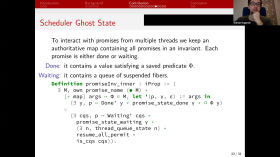Blog
The OCaml Planet
Articles and videos contributed by both experts, companies and passionate developers from the OCaml community. From in-depth technical articles, project highlights, community news, or insights into Open Source projects, the OCaml Planet RSS feed aggregator has something for everyone.
Want your Blog Posts or Videos to Show Here?
To contribute a blog post, or add your RSS feed, check out the Contributing Guide on GitHub.
How can you be sure that an OCaml function you wrote is actually tail-recursive? You can certainly compile the code and look at the generated assembly code, but that’d be quite the overkill, given there is a much simpler way to do this.
Effective documentation is a cornerstone of software development. It helps developers understand how to use a language, its libraries, and…
Lightweight asynchronous programming (using futures, goroutines or green threads) has been widely adopted to organize programs with many concurrent tasks, more than are traditionally feasible with thread-per-task models of concurrency. With the...
This video introduces how to make and use local parameters in OCaml. As demonstrated in the video, a local parameter to a function is not allowed to be stored or returned. Using local parameters can allow us to allocate less garbage-collected memory, as later videos will demonstrate. View instructions to get the compiler I use in this video: https://github.com/janestreet/opam-repository/tree/with-extensions
This video introduces how to make and use local parameters in OCaml. As demonstrated in the video, a local parameter to a function is not allowed to be stored or returned. Using local parameters can allow us to allocate less garbage-collected memory, as later videos will demonstrate. View instructions to get the compiler I use in this video: https://github.com/janestreet/opam-repository/tree/with-extensions
If you've ever had to parse anything, (anything really), I want to show you a glimpse of what it could look like when you parse it binary string pattern matching in OCaml like you'd do on Erlang, Elixir, or Gleam.
Building static binaries can come in handy. Most notably, when the time comes to distribute executables. Fortunately, building static binaries from OCaml projects can be achieved pretty easily, when you know what you are doing.





